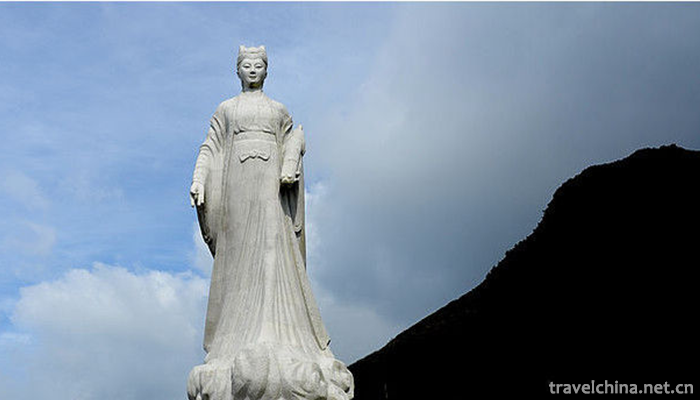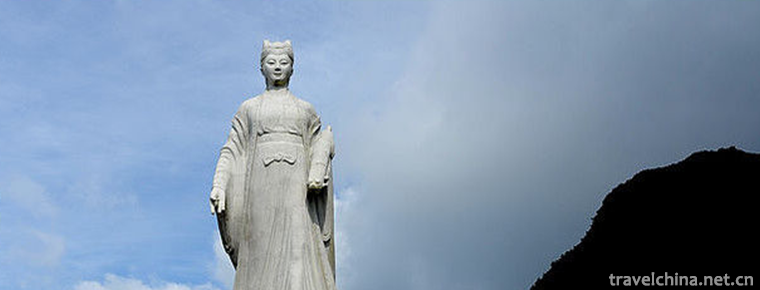Ma Xian Xing custom
Ma Xian Xing custom
The belief in Ma Xian is a traditional folk custom inherited from generation to generation by the people of Fujian and Zhejiang. Ma Xian, also known as Ma Xiaoxian, is a goddess worshipped in northeastern Fujian and southeastern Zhejiang. For decades, mother-in-law and daughter-in-law depended on each other, tolerated humiliation and burdened her, and served her aunt diligently until she died. His filial piety touched the heavens, passed on as a good story, and was sacrificed to God after his death. Tang Suzong was named "Mrs. Mars Protector of the Nation" when he was emperor. He was also known as the three goddesses of Fujian and Zhejiang together with Mazu and Chen Jinggu.
Folklore introduction
Ma Xian Folklore is a kind of folk custom which was approved by the State Council in 2014 and listed in the fourth batch of national intangible cultural heritage list.
The belief in Ma Xian is a traditional folk custom inherited from generation to generation by the people of Fujian and Zhejiang. Ma Xian, also known as Ma Xiaoxian, is a goddess worshipped in northeastern Fujian and southeastern Zhejiang. For decades, mother-in-law and daughter-in-law depended on each other, tolerated humiliation and burdened her, and served her aunt diligently until she died. His filial piety touched the heavens, passed on as a good story, and was sacrificed to God after his death. Tang Suzong was named "Mrs. Mars Protector of the Nation" when he was emperor. He was also known as the three goddesses of Fujian and Zhejiang together with Mazu and Chen Jinggu. Ma Xianxiao's filial piety is also regarded as a model of filial piety by the upper class. Famous historical figures such as Li Yangbing, Liu Bowen and Feng Menglong all wrote articles to praise it. Ma Xian belief was introduced into Zherong in the Song and Yuan Dynasties. It was not only regarded as a model of filial piety, but also became the spiritual sustenance of the people in eliminating disease, eliminating disaster and resisting disaster. Every year, "Yingxian" Temple Ceremony is held. Mothers or mothers-in-law lead their daughters and daughters-in-law to the temple to offer sacrifices. They tell the story of Ma Xian's filial piety and pass on the spirit of filial piety, thus forming a complete set of Ma Xian's beliefs and customs. During the Ming and Qing Dynasties, Ma Xian's beliefs and customs were widely spread and deeply rooted in Funing Prefecture (now Eastern Fujian). Zherong is the center of Maxian belief. The most typical and influential activities of Maxian belief are Zherong. Its influence extends to Fujian, Zhejiang, Jiangxi, Guangdong, Taiwan and Southeast Asia, with more than 20 million followers. Zherong Dongshi Mountain, known as "Xianshan", is a sacred mountain for worshippers of Ma Xian on the border between Fujian and Zhejiang. It is said that the Lingyan Cave on the mountain is Ma Xian's temple and its central place is Ma Xian Temple in Chengguan Xianyu. The thousand-year inheritance of Ma Xian's beliefs and customs has left many cultural relics and attractions, including Lingyan Cave in Song Dynasty, Ma Xian Temple in Yuan Dynasty, Dongshishan Cliff Carvings in Ming Dynasty, and plaques in Ming and Qing Dynasty. There are Baizhangyan, cactus footprints, cactus stream, cactus spring and cactus island.
Forms of expression
The main manifestation of Ma Xian's religion and custom is to hold a grand party on the seventh day of the seventh month of the lunar calendar every year. Its activities consist of the following links: receiving immortals, starting from the Lingyan Cave; offering sacrifices, ritual ceremonies, the central venue in the Maxian Temple of Chengguan Xianyu; traveling in the thirteenth border in order; sending immortals, and sending Ma Xiangyu back to the Lingyan Cave solemnly. At the same time, folk art exhibitions are held, mainly including: Taige, opera, puppet, lantern art, acrobatics, dance, lantern riddles and so on. During the celestial reception, the mother took her children and mother-in-law took her daughter-in-law to worship Ma Xian. Ma Xian was worshipped as a model of filial piety, and gradually evolved into a local god of protection for people to dispel illness, alleviate disaster and protect peace.
Ma Xian's faith and custom activities are to pray for a peaceful country, a prosperous life, harmonious friendship in the thirteenth realm, the integration of traditional morality and filial piety with modern civilization, and the performance of folk traditional art. Ma Xian's religion advocates serving mothers, filial piety, good neighborhood and benefiting the world, which has moral education value. It has important practical enlightenment value for building a harmonious society through the friendship of thirteen borders. During the Ma Xian Temple Festival, mothers and daughters, mothers-in-law and daughters-in-law worshiped Ma Xian, and spread the virtue of Ma Xian's filial piety to their parents-in-law, so as to spread the traditional filial piety culture from generation to generation, promote family harmony and contribute to the construction of a happy family and a civilized society. In the ceremony of "welcoming immortals", the followers run through the whole process with the concept of filial piety, harmony, health and peace, especially advocating and disseminating the filial piety culture of harmony between mother-in-law and daughter-in-law, neighborhood harmony, diligence and thrift, which has the deep-seated characteristics of social morality and is worthy of imitation and implementation in the contemporary era. Influenced by the lack of traditional filial piety education in the contemporary era, the concepts of filial piety, harmony, health and peace advocated by Ma Xian's beliefs and customs not only conform to the traditional virtues of the Chinese nation, but also conform to the moral education of today's society. They have important practical significance and mainstream value in promoting traditional culture and building a harmonious society. Horse custom belief activities provide a carrier for the inheritance of Zherong folk culture and art. Many folk arts, such as string puppet show, bag show, floor show, elevation Pavilion decoration, lighting paper-cut and other skills, are inherited and consolidated in the ceremony activities, and create opportunities for artists'artistic creation and development; Horse custom belief activities, for the government to understand and protect the intangible heritage. Conservation provides complete information, which still has important enlightenment and reference value for the construction of contemporary modern culture.


-
1.Duck Blood in Chili Sauce
The main ingredients of hairy blood are duck blood, cooking techniques are mainly cooked, and tastes are spicy and spicy. Originated in Chongqing, popular in Chongqing and southwest China, it is a fam
Time 2018-10-27 -
2.Putuo Mountain Scenic Spot
Putuo Mountain Scenic Spot, located about 100 nautical miles east of Hangzhou Bay, Zhejiang Province, is an island in Zhoushan Islands. The island covers an area of 12.5 square kilometers
Time 2018-12-07 -
3.Four Seasons Hotel Guangzhou
Four Seasons Hotel Guangzhou is located in Guangzhou International Finance Center on the 103th floor of Zhujiang New Town, the financial center of Guangzhou, at the top of this modern landmark.
Time 2018-12-16 -
4.Du Shoutians former residence
Du Shitian's former residence is the old residence of Du Shitian, the emperor's teacher of the Qing Dynasty, as well as the old residence of many famous officials of the Du family. Located in Binzhou
Time 2019-01-08 -
5.Drum Mountain
Gushan is located in the east of Jin'an District, Fuzhou City, Fujian Province, and on the North Bank of Minjiang River. It is about 8 kilometers away from the downtown area. It is one of the most fam
Time 2019-01-12 -
6.Guyuan Northern Dynasty Sui and Tang Dynasties Cemetery
The tombs of the Northern Dynasty and Sui and Tang Dynasties in Guyuan are located in Xiaomazhuang, Yangfang, Shengou, Dabao, Wanglioba, five natural villages in the West and south suburbs of Yuanzhou
Time 2019-01-12 -
7.Yongji Ecological Park
Yongji Eco-Park is located in Daling Town, Huidong County, Huizhou City, Guangdong Province. It covers an area of about 1300 mu. It was solely invested and constructed by Hong Kong Yongji Food Group i
Time 2019-03-05 -
8.Ah Xi Xian Ji
"Xianji" is an epic of the Ashi people of the Yi tribe, which is spread orally among the Ashi people in the Xishan area of Maile City, Yunnan Province. "Xianji" is the transliterat
Time 2019-03-28 -
9.Lantern Festival
It is closely related to the folk custom of Lantern appreciation in China. According to textual research, lantern appreciation began in the Western Han Dynasty and flourished in the Sui and Tang Dynas
Time 2019-04-26 -
10.Exhibit of lanterns
The Lantern Festival is an ancient folk culture in China. It generally refers to the large-scale lighting exhibition held by the government around the Spring Festival and the Lantern Festival
Time 2019-04-26 -
11.Sun Tzu
Sun Wu (about 545 BC - about 470 BC), long Qing, late spring and autumn. Qi State Le An (today) Shandong ProvincePeople in the North 。 China's famous military strategist and statesman in the spring an
Time 2019-09-04 -
12.China Foreign Affairs University
China Foreign Affairs University is a small scale, high level and distinctive foreign ministry's sole institution directly under the guidance of serving the cause of China's diplomacy and cultivating
Time 2019-11-29